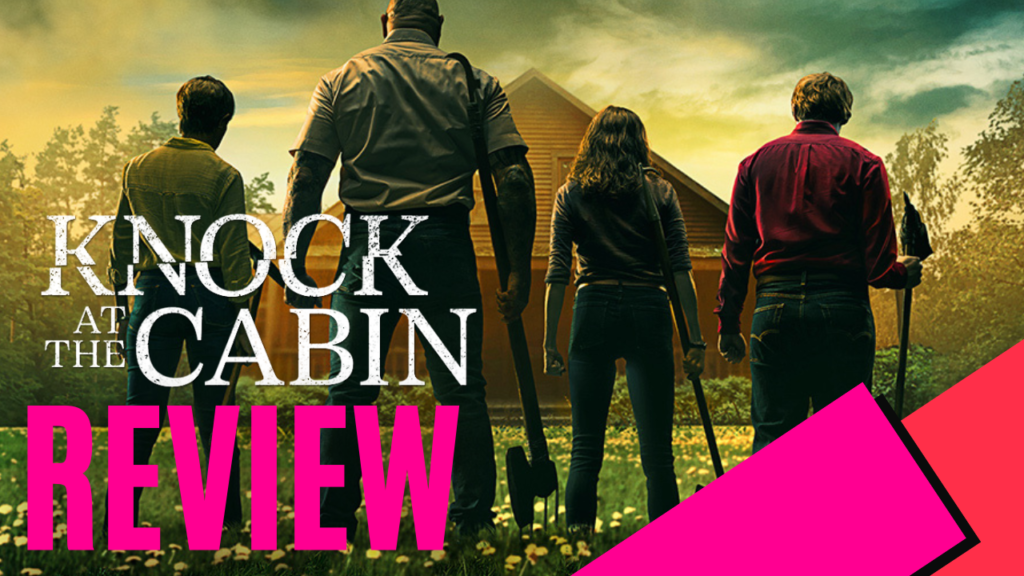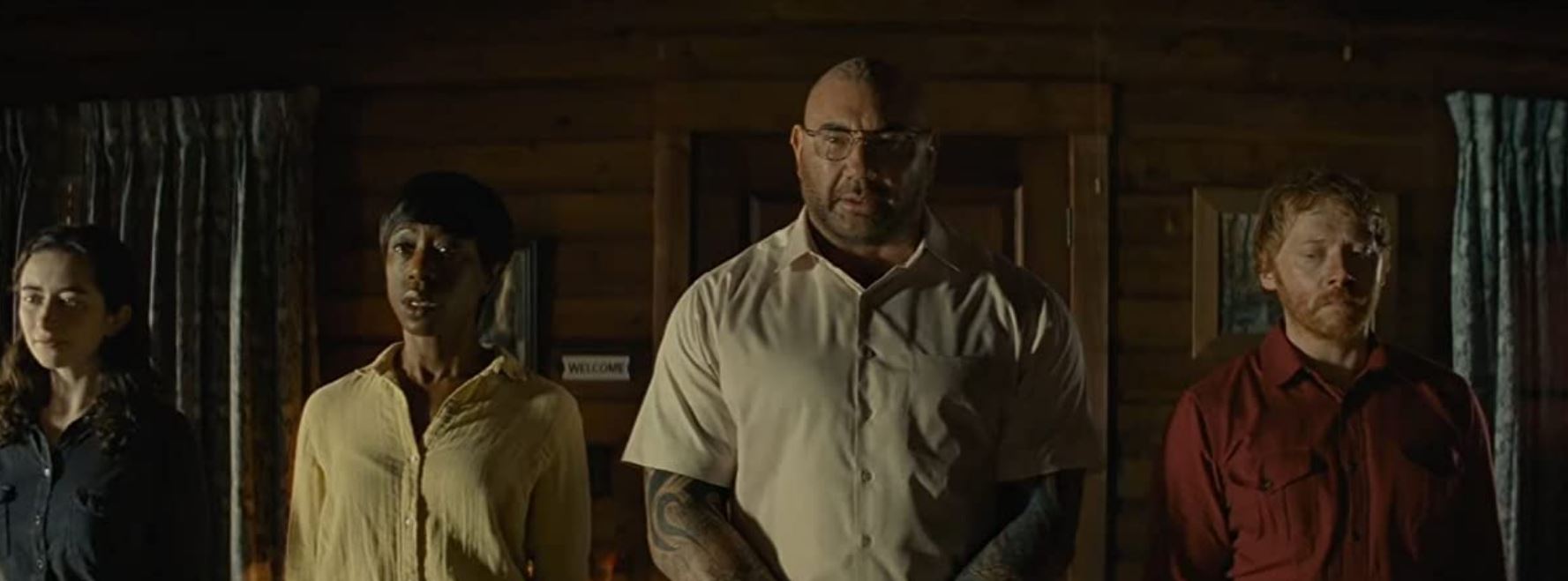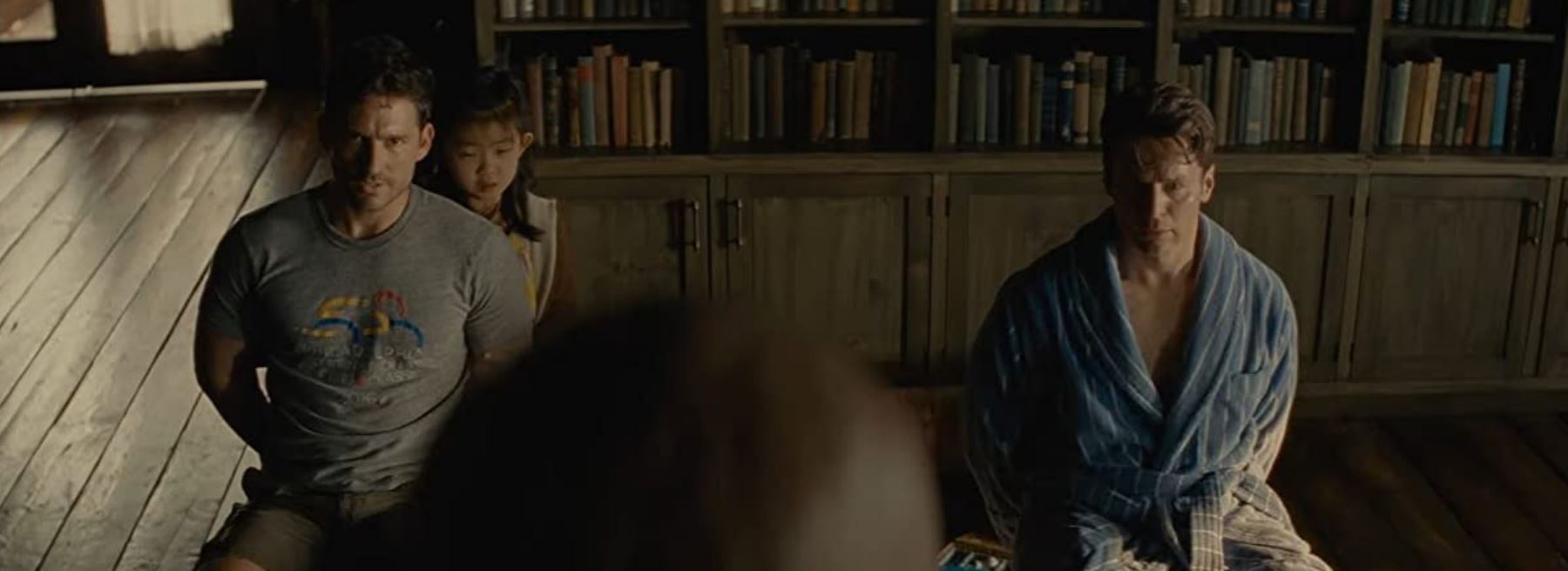
The new M. Night Shyamalan directed film, Knock at the Cabin, is a psychological thriller that pits a family of three against an impossible choice. Best known for his work and infatuation with the dark and twisted nature of storytelling, as seen in the likes of “The Sixth Sense” and “Signs,” his skill set brings that familiar feeling with the adaptation of the Paul G. Tremblay novel, Cabin at the End of the World. Given the nature of how an M. Night stories are usually presented, there will be slight spoilers on the theme and progression of the film to fully encapsulate the essence of this review.
Two fathers and a daughter have taken a vacation out of town to a secluded cabin in the heart of the woodlands. The film hits the ground running with a young Wen, portrayed by Kristen Cui, who finds herself alone with a stranger named Leonard, played by Dave Bautista, who immediately subverts expectations with a soft demeanour, despite his dominating frame. The curiosity about his appearance was planted early and deepened when his three companions toting hand-crafted weaponry fell in line as Wen sought shelter in the cabin with her fathers. Then there was a knock at the cabin door, and the deafening tone rang true through the hearts of the small family.
Andrew, brought to life by Ben Aldrige, proactively reacts to the looming threat, while Eric, interpreted by Jonathan Groff, engages defensively and tries to comfort their daughter. The group of four strangers were desperate to be let in, their tone, however, was layered with a hint of fear and compassion instead of an aggression or threatening manner. The tension alone was built by the confusion of the situation, and after the family’s refusal to let them in, they broke in, injuring Eric in the process. The use of a relatively small cabin interior would serve as the almost claustrophobic prison for the remainder of the film and the character moments were left to fill the space.

I would say for the next section there will be discussions on topics that would be considered spoilers, but they won’t overtly spoil the film itself. The four intruders then began to outline the reason for their invasion and the dire situation they all found themselves in. An impossible proposition was placed on the family; they had to choose one member to sacrifice or the world would end. The problem was that the only proof they could offer came in the collective response that their induvial visions brought them together, which was not a compelling enough argument for either Andrew or Eric to swallow.
The unruliest member of the four, Redmond, played by Rupert Grint, was clearly rattled that they would not get the family to choose and inadvertently caused their captives to verbally lash out, only increasing the barrier between them all. Redmond’s unstable behaviour became clear as to why he was so reactive; With the first official decline of the family to choose a sacrifice among themselves, he was sacrificed instead, and the first wave of natural disasters that would lead to the Earth’s destruction began.
The tight nit camera work and vague musical score gave the heartfelt narrative plenty of opportunity for the audience soak in the gravity of the situation. Sabrina, portrayed by Nikki Amuka-Bird, was the most compassionate of the four, and now that it was apparent to the audience that their refusal would lead to these intruders sacrificing themselves, the three remaining intruders were terrified for their lives and would do anything to convince the family that this was real.

The tonal shift became their pleas to Andrew and Eric that they could stop the world’s demise and their own deaths in the process. I could feel a pull towards an existential crisis of guilt that was similar to picking between saving your loved one or redirecting a train to head towards a group of people, there was an underlying problem though.
Despite the attempts to convey their genuine fears of the impending doom and how their small sacrifice for the greater good was necessary, there was very little reason for either Andrew or Eric to believe them. The disasters that eventuated because of the sacrifices were too coincidental and I found it hard to envision myself believing it if I was in that situation. There was a slow build, however, through flashbacks that did help the viewer to realise why Andrew felt that this religious-based exposition was focused on his sexuality.
Previously having been rejected, attacked, and disowned helped create a chip on his shoulder. Even so, the final act was hurt by holding its card to close for the early portions of the film and then struggling to lead to a conclusive message. The threat of a potential apocalypse was an open platform to reflect on our contribution to humanity, yet there wasn’t enough run time to fully explore the deeper meaning behind why they were chosen and what would happen next when the film ended.
Knock at the Cabin is a sensationalised vision of humanity at the end of its rope and about the weight of personal sacrifice. The premise of the film and the use of the inner confines of the small cabin was heavily influenced by what M. Night Shyamalan does best, but stumbles on its notes towards the end.

The Good
- Individual performances were strong
- Claustrophobic confines of the cabin added to the tension
- Loose narrative on humanity and our personal contributions to it
The Bad
- Run time was too short for the story they wanted to tell
- Tension earned was easily lost by ambiguity








